Imperial Hotel: Personal Skill Audit and Development Plan
VerifiedAdded on 2020/10/22
|12
|3615
|112
Report
AI Summary
This report provides a comprehensive analysis of personal skill audits and professional development plans within the context of the hospitality industry, using Imperial Hotel as a case study. It begins with an introduction to the concepts of skill audits and development plans, emphasizing their importance for individual growth and organizational success. The report then explores the benefits of ongoing professional development for stakeholders, including increased productivity, employee engagement, trust, goodwill, and career growth. It further examines the expectations of professional employers regarding skills and competencies, such as communication, customer service, teamwork, leadership, and cultural awareness. The report includes a self-assessment of the author's abilities and competencies for a specific job role, along with a discussion of various personal theories and approaches used for personal and professional development, such as behaviorist, social learning, cognitive, and humanistic approaches. A development plan is constructed to enhance skills and competencies within the specified work context. Finally, the report concludes with an overview of a job interview process and a review of its strengths and weaknesses. The assignment highlights the importance of continuous learning and development for both individuals and organizations in the dynamic hospitality sector.
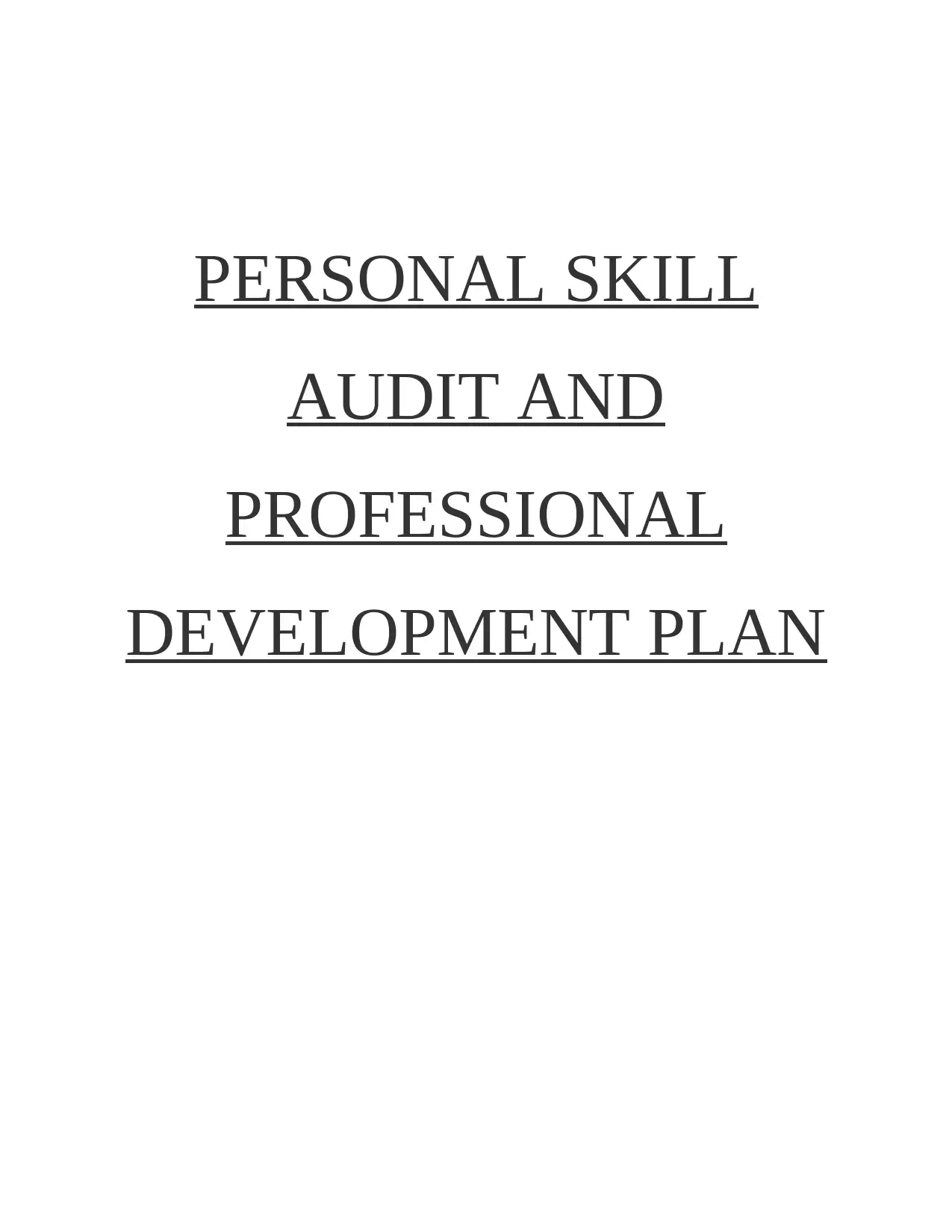
PERSONAL SKILL
AUDIT AND
PROFESSIONAL
DEVELOPMENT PLAN
AUDIT AND
PROFESSIONAL
DEVELOPMENT PLAN
Paraphrase This Document
Need a fresh take? Get an instant paraphrase of this document with our AI Paraphraser
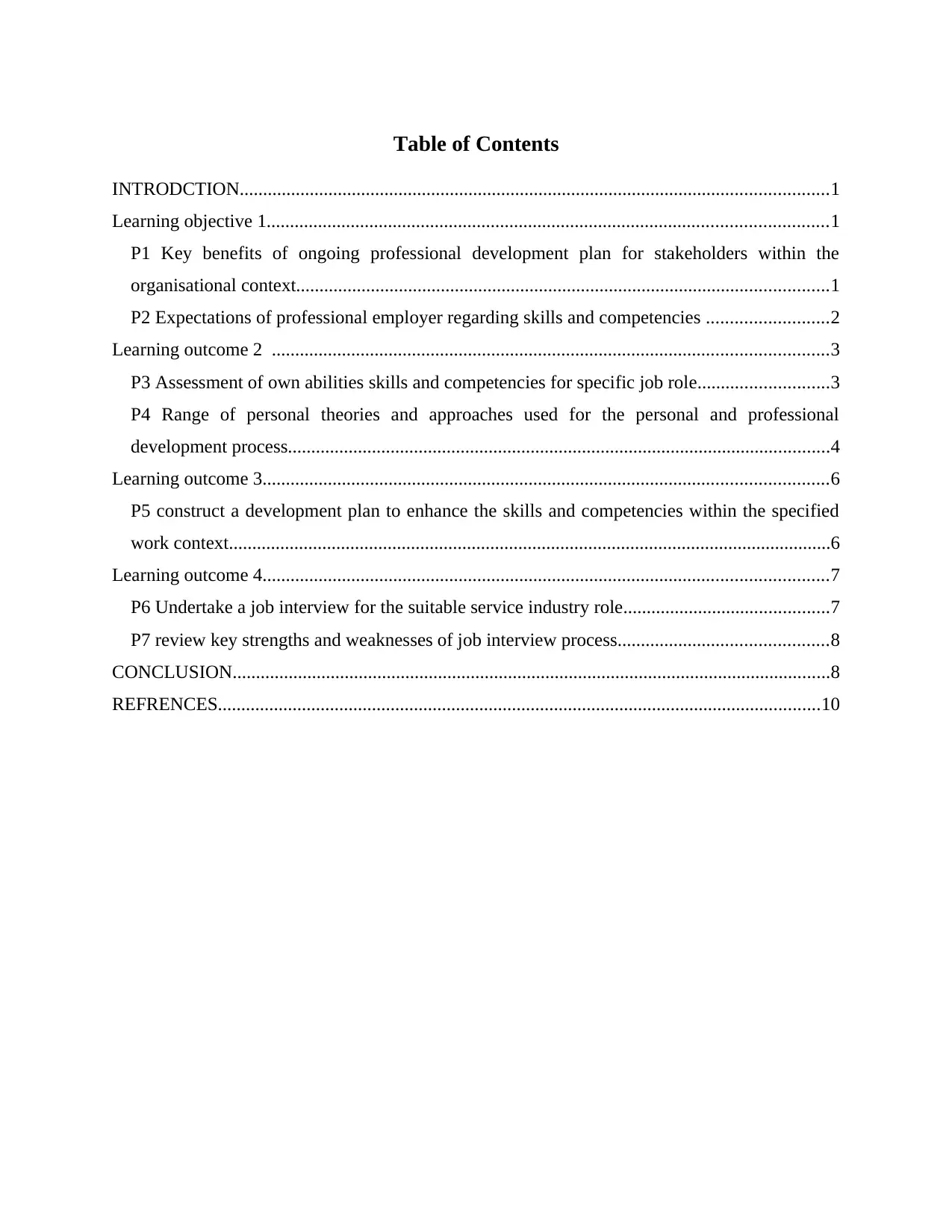
Table of Contents
INTRODCTION..............................................................................................................................1
Learning objective 1........................................................................................................................1
P1 Key benefits of ongoing professional development plan for stakeholders within the
organisational context..................................................................................................................1
P2 Expectations of professional employer regarding skills and competencies ..........................2
Learning outcome 2 .......................................................................................................................3
P3 Assessment of own abilities skills and competencies for specific job role............................3
P4 Range of personal theories and approaches used for the personal and professional
development process....................................................................................................................4
Learning outcome 3.........................................................................................................................6
P5 construct a development plan to enhance the skills and competencies within the specified
work context.................................................................................................................................6
Learning outcome 4.........................................................................................................................7
P6 Undertake a job interview for the suitable service industry role............................................7
P7 review key strengths and weaknesses of job interview process.............................................8
CONCLUSION................................................................................................................................8
REFRENCES.................................................................................................................................10
INTRODCTION..............................................................................................................................1
Learning objective 1........................................................................................................................1
P1 Key benefits of ongoing professional development plan for stakeholders within the
organisational context..................................................................................................................1
P2 Expectations of professional employer regarding skills and competencies ..........................2
Learning outcome 2 .......................................................................................................................3
P3 Assessment of own abilities skills and competencies for specific job role............................3
P4 Range of personal theories and approaches used for the personal and professional
development process....................................................................................................................4
Learning outcome 3.........................................................................................................................6
P5 construct a development plan to enhance the skills and competencies within the specified
work context.................................................................................................................................6
Learning outcome 4.........................................................................................................................7
P6 Undertake a job interview for the suitable service industry role............................................7
P7 review key strengths and weaknesses of job interview process.............................................8
CONCLUSION................................................................................................................................8
REFRENCES.................................................................................................................................10
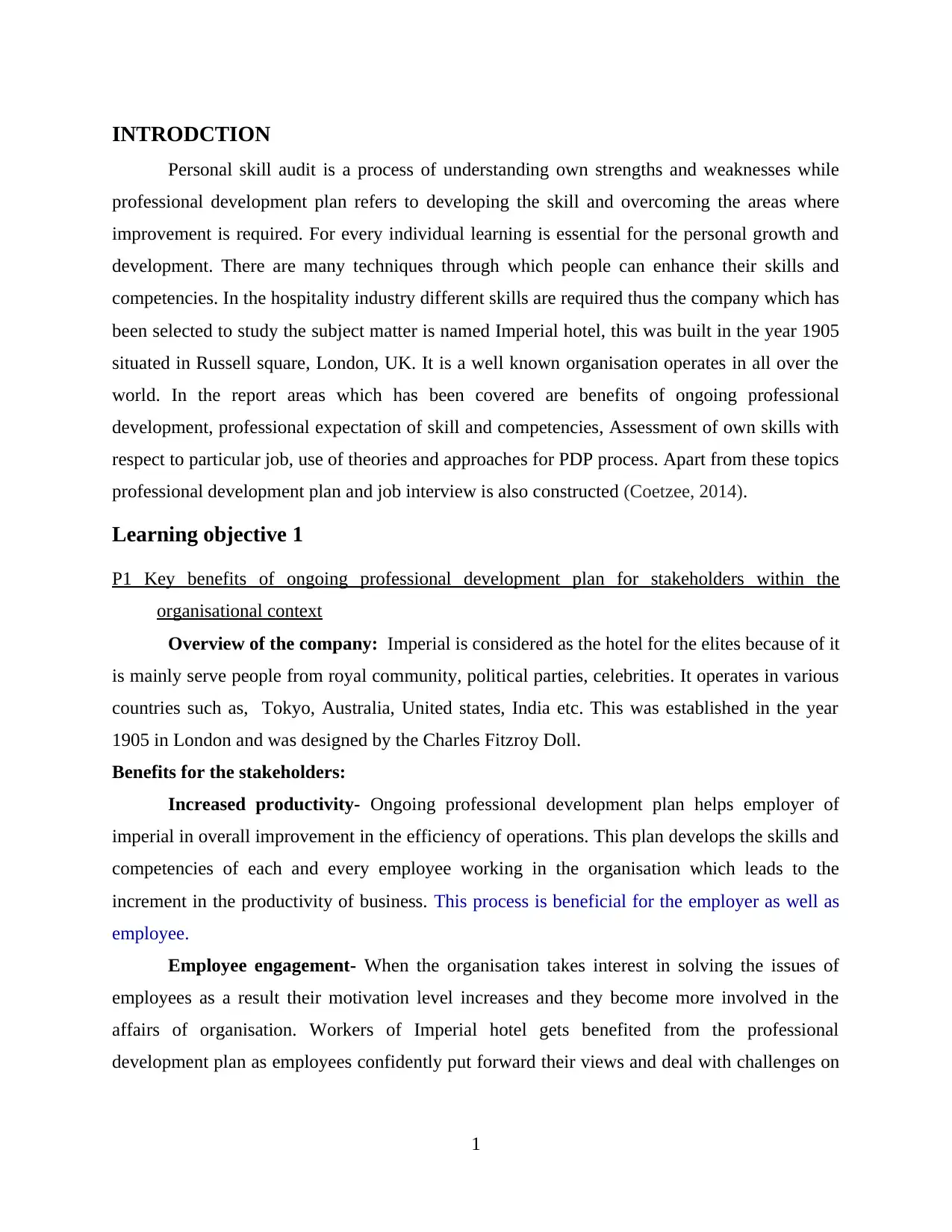
INTRODCTION
Personal skill audit is a process of understanding own strengths and weaknesses while
professional development plan refers to developing the skill and overcoming the areas where
improvement is required. For every individual learning is essential for the personal growth and
development. There are many techniques through which people can enhance their skills and
competencies. In the hospitality industry different skills are required thus the company which has
been selected to study the subject matter is named Imperial hotel, this was built in the year 1905
situated in Russell square, London, UK. It is a well known organisation operates in all over the
world. In the report areas which has been covered are benefits of ongoing professional
development, professional expectation of skill and competencies, Assessment of own skills with
respect to particular job, use of theories and approaches for PDP process. Apart from these topics
professional development plan and job interview is also constructed (Coetzee, 2014).
Learning objective 1
P1 Key benefits of ongoing professional development plan for stakeholders within the
organisational context
Overview of the company: Imperial is considered as the hotel for the elites because of it
is mainly serve people from royal community, political parties, celebrities. It operates in various
countries such as, Tokyo, Australia, United states, India etc. This was established in the year
1905 in London and was designed by the Charles Fitzroy Doll.
Benefits for the stakeholders:
Increased productivity- Ongoing professional development plan helps employer of
imperial in overall improvement in the efficiency of operations. This plan develops the skills and
competencies of each and every employee working in the organisation which leads to the
increment in the productivity of business. This process is beneficial for the employer as well as
employee.
Employee engagement- When the organisation takes interest in solving the issues of
employees as a result their motivation level increases and they become more involved in the
affairs of organisation. Workers of Imperial hotel gets benefited from the professional
development plan as employees confidently put forward their views and deal with challenges on
1
Personal skill audit is a process of understanding own strengths and weaknesses while
professional development plan refers to developing the skill and overcoming the areas where
improvement is required. For every individual learning is essential for the personal growth and
development. There are many techniques through which people can enhance their skills and
competencies. In the hospitality industry different skills are required thus the company which has
been selected to study the subject matter is named Imperial hotel, this was built in the year 1905
situated in Russell square, London, UK. It is a well known organisation operates in all over the
world. In the report areas which has been covered are benefits of ongoing professional
development, professional expectation of skill and competencies, Assessment of own skills with
respect to particular job, use of theories and approaches for PDP process. Apart from these topics
professional development plan and job interview is also constructed (Coetzee, 2014).
Learning objective 1
P1 Key benefits of ongoing professional development plan for stakeholders within the
organisational context
Overview of the company: Imperial is considered as the hotel for the elites because of it
is mainly serve people from royal community, political parties, celebrities. It operates in various
countries such as, Tokyo, Australia, United states, India etc. This was established in the year
1905 in London and was designed by the Charles Fitzroy Doll.
Benefits for the stakeholders:
Increased productivity- Ongoing professional development plan helps employer of
imperial in overall improvement in the efficiency of operations. This plan develops the skills and
competencies of each and every employee working in the organisation which leads to the
increment in the productivity of business. This process is beneficial for the employer as well as
employee.
Employee engagement- When the organisation takes interest in solving the issues of
employees as a result their motivation level increases and they become more involved in the
affairs of organisation. Workers of Imperial hotel gets benefited from the professional
development plan as employees confidently put forward their views and deal with challenges on
1
⊘ This is a preview!⊘
Do you want full access?
Subscribe today to unlock all pages.

Trusted by 1+ million students worldwide
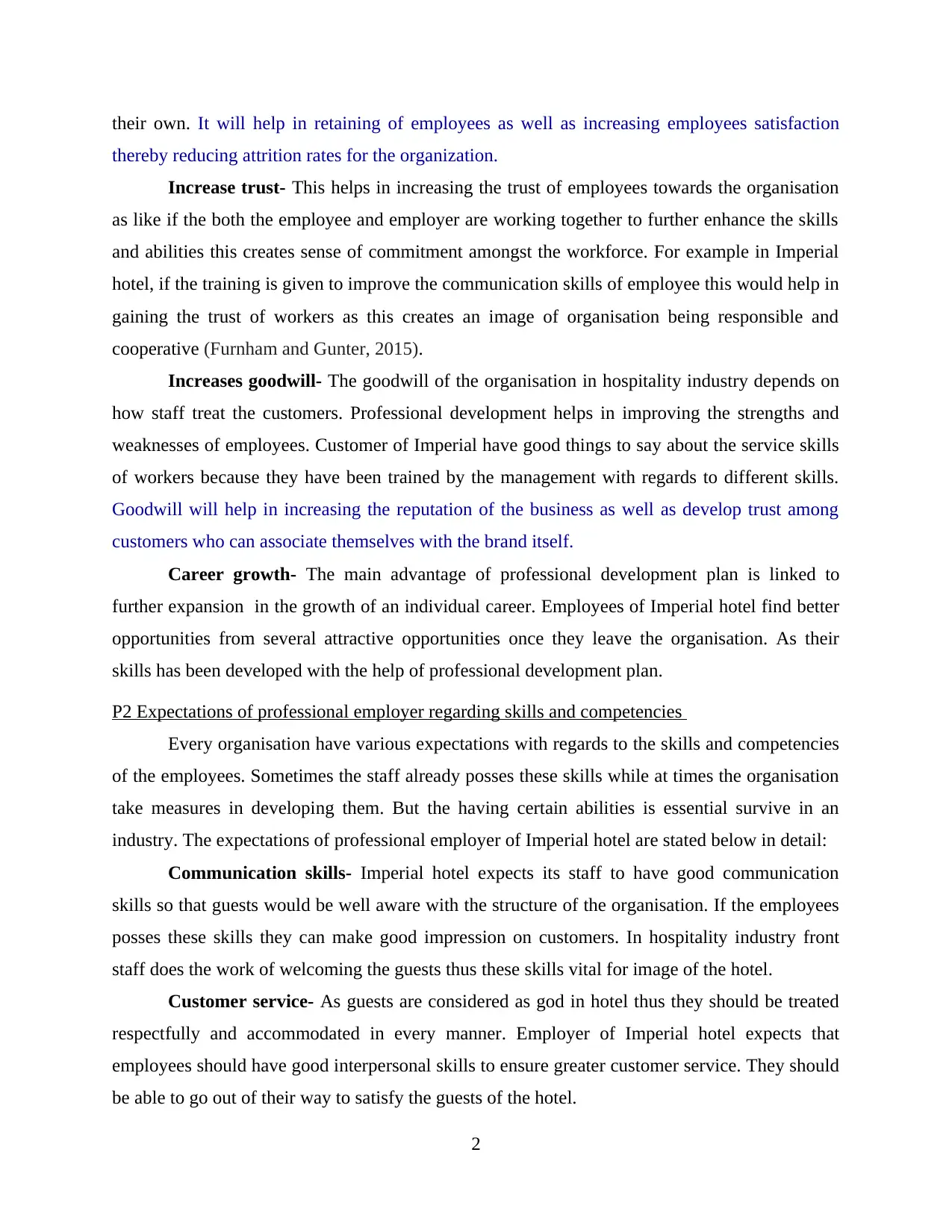
their own. It will help in retaining of employees as well as increasing employees satisfaction
thereby reducing attrition rates for the organization.
Increase trust- This helps in increasing the trust of employees towards the organisation
as like if the both the employee and employer are working together to further enhance the skills
and abilities this creates sense of commitment amongst the workforce. For example in Imperial
hotel, if the training is given to improve the communication skills of employee this would help in
gaining the trust of workers as this creates an image of organisation being responsible and
cooperative (Furnham and Gunter, 2015).
Increases goodwill- The goodwill of the organisation in hospitality industry depends on
how staff treat the customers. Professional development helps in improving the strengths and
weaknesses of employees. Customer of Imperial have good things to say about the service skills
of workers because they have been trained by the management with regards to different skills.
Goodwill will help in increasing the reputation of the business as well as develop trust among
customers who can associate themselves with the brand itself.
Career growth- The main advantage of professional development plan is linked to
further expansion in the growth of an individual career. Employees of Imperial hotel find better
opportunities from several attractive opportunities once they leave the organisation. As their
skills has been developed with the help of professional development plan.
P2 Expectations of professional employer regarding skills and competencies
Every organisation have various expectations with regards to the skills and competencies
of the employees. Sometimes the staff already posses these skills while at times the organisation
take measures in developing them. But the having certain abilities is essential survive in an
industry. The expectations of professional employer of Imperial hotel are stated below in detail:
Communication skills- Imperial hotel expects its staff to have good communication
skills so that guests would be well aware with the structure of the organisation. If the employees
posses these skills they can make good impression on customers. In hospitality industry front
staff does the work of welcoming the guests thus these skills vital for image of the hotel.
Customer service- As guests are considered as god in hotel thus they should be treated
respectfully and accommodated in every manner. Employer of Imperial hotel expects that
employees should have good interpersonal skills to ensure greater customer service. They should
be able to go out of their way to satisfy the guests of the hotel.
2
thereby reducing attrition rates for the organization.
Increase trust- This helps in increasing the trust of employees towards the organisation
as like if the both the employee and employer are working together to further enhance the skills
and abilities this creates sense of commitment amongst the workforce. For example in Imperial
hotel, if the training is given to improve the communication skills of employee this would help in
gaining the trust of workers as this creates an image of organisation being responsible and
cooperative (Furnham and Gunter, 2015).
Increases goodwill- The goodwill of the organisation in hospitality industry depends on
how staff treat the customers. Professional development helps in improving the strengths and
weaknesses of employees. Customer of Imperial have good things to say about the service skills
of workers because they have been trained by the management with regards to different skills.
Goodwill will help in increasing the reputation of the business as well as develop trust among
customers who can associate themselves with the brand itself.
Career growth- The main advantage of professional development plan is linked to
further expansion in the growth of an individual career. Employees of Imperial hotel find better
opportunities from several attractive opportunities once they leave the organisation. As their
skills has been developed with the help of professional development plan.
P2 Expectations of professional employer regarding skills and competencies
Every organisation have various expectations with regards to the skills and competencies
of the employees. Sometimes the staff already posses these skills while at times the organisation
take measures in developing them. But the having certain abilities is essential survive in an
industry. The expectations of professional employer of Imperial hotel are stated below in detail:
Communication skills- Imperial hotel expects its staff to have good communication
skills so that guests would be well aware with the structure of the organisation. If the employees
posses these skills they can make good impression on customers. In hospitality industry front
staff does the work of welcoming the guests thus these skills vital for image of the hotel.
Customer service- As guests are considered as god in hotel thus they should be treated
respectfully and accommodated in every manner. Employer of Imperial hotel expects that
employees should have good interpersonal skills to ensure greater customer service. They should
be able to go out of their way to satisfy the guests of the hotel.
2
Paraphrase This Document
Need a fresh take? Get an instant paraphrase of this document with our AI Paraphraser
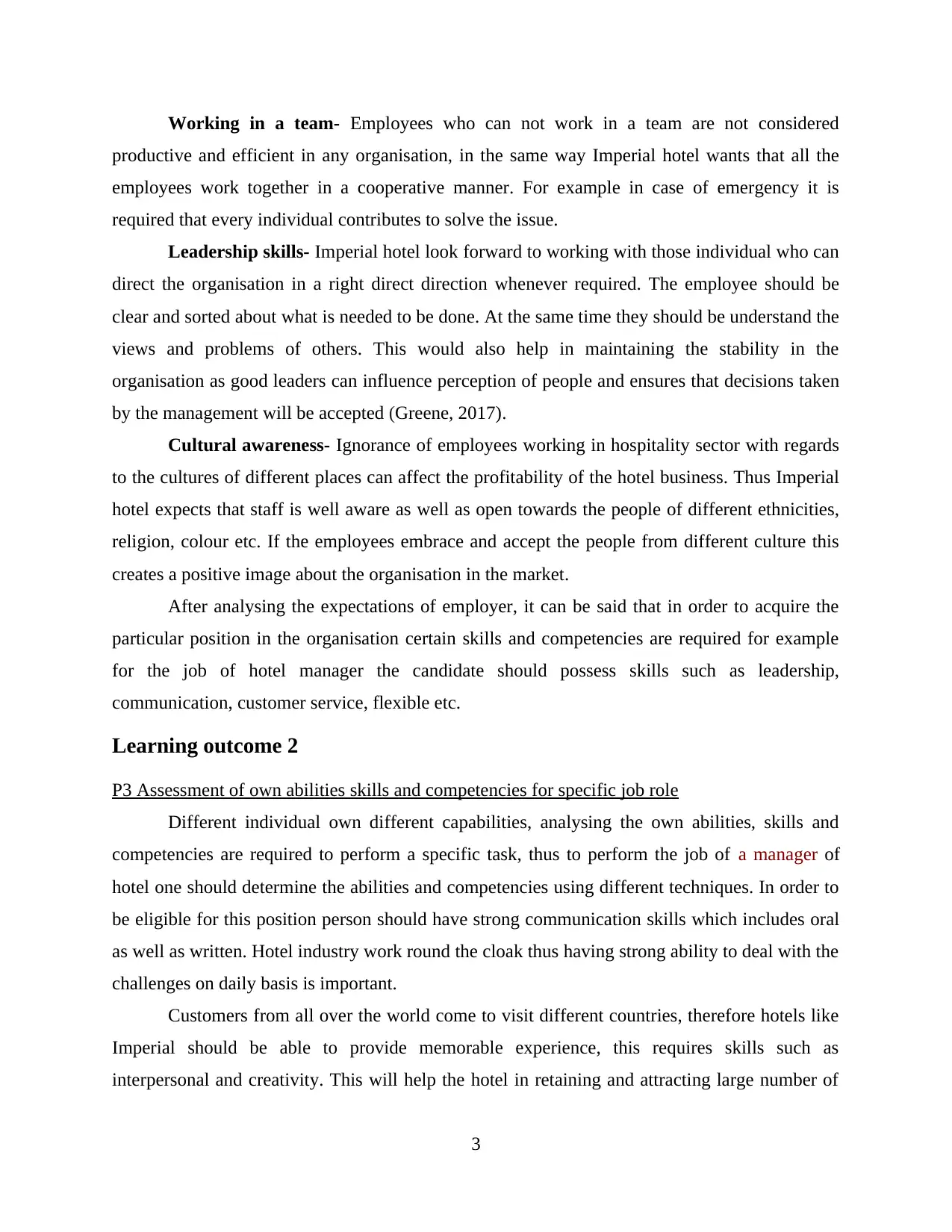
Working in a team- Employees who can not work in a team are not considered
productive and efficient in any organisation, in the same way Imperial hotel wants that all the
employees work together in a cooperative manner. For example in case of emergency it is
required that every individual contributes to solve the issue.
Leadership skills- Imperial hotel look forward to working with those individual who can
direct the organisation in a right direct direction whenever required. The employee should be
clear and sorted about what is needed to be done. At the same time they should be understand the
views and problems of others. This would also help in maintaining the stability in the
organisation as good leaders can influence perception of people and ensures that decisions taken
by the management will be accepted (Greene, 2017).
Cultural awareness- Ignorance of employees working in hospitality sector with regards
to the cultures of different places can affect the profitability of the hotel business. Thus Imperial
hotel expects that staff is well aware as well as open towards the people of different ethnicities,
religion, colour etc. If the employees embrace and accept the people from different culture this
creates a positive image about the organisation in the market.
After analysing the expectations of employer, it can be said that in order to acquire the
particular position in the organisation certain skills and competencies are required for example
for the job of hotel manager the candidate should possess skills such as leadership,
communication, customer service, flexible etc.
Learning outcome 2
P3 Assessment of own abilities skills and competencies for specific job role
Different individual own different capabilities, analysing the own abilities, skills and
competencies are required to perform a specific task, thus to perform the job of a manager of
hotel one should determine the abilities and competencies using different techniques. In order to
be eligible for this position person should have strong communication skills which includes oral
as well as written. Hotel industry work round the cloak thus having strong ability to deal with the
challenges on daily basis is important.
Customers from all over the world come to visit different countries, therefore hotels like
Imperial should be able to provide memorable experience, this requires skills such as
interpersonal and creativity. This will help the hotel in retaining and attracting large number of
3
productive and efficient in any organisation, in the same way Imperial hotel wants that all the
employees work together in a cooperative manner. For example in case of emergency it is
required that every individual contributes to solve the issue.
Leadership skills- Imperial hotel look forward to working with those individual who can
direct the organisation in a right direct direction whenever required. The employee should be
clear and sorted about what is needed to be done. At the same time they should be understand the
views and problems of others. This would also help in maintaining the stability in the
organisation as good leaders can influence perception of people and ensures that decisions taken
by the management will be accepted (Greene, 2017).
Cultural awareness- Ignorance of employees working in hospitality sector with regards
to the cultures of different places can affect the profitability of the hotel business. Thus Imperial
hotel expects that staff is well aware as well as open towards the people of different ethnicities,
religion, colour etc. If the employees embrace and accept the people from different culture this
creates a positive image about the organisation in the market.
After analysing the expectations of employer, it can be said that in order to acquire the
particular position in the organisation certain skills and competencies are required for example
for the job of hotel manager the candidate should possess skills such as leadership,
communication, customer service, flexible etc.
Learning outcome 2
P3 Assessment of own abilities skills and competencies for specific job role
Different individual own different capabilities, analysing the own abilities, skills and
competencies are required to perform a specific task, thus to perform the job of a manager of
hotel one should determine the abilities and competencies using different techniques. In order to
be eligible for this position person should have strong communication skills which includes oral
as well as written. Hotel industry work round the cloak thus having strong ability to deal with the
challenges on daily basis is important.
Customers from all over the world come to visit different countries, therefore hotels like
Imperial should be able to provide memorable experience, this requires skills such as
interpersonal and creativity. This will help the hotel in retaining and attracting large number of
3

clients apart from these skills there are few competencies as well which are essential to become
Hotel manager such as leadership qualities. Managers needs to be good leader first, they should
be able to understand the issues and situations of employees working in each and every
department. They can lead the activities performed by individual and maintains the productivity
and effectiveness of business. Some people are inborn with these talents while some have to
work hard to develop this.
The tool which can be used to assess the skills and competencies is skill audit, this
method helps in identifying the strengths and limitation of an individual. This is a useful
technique through which objectives such as enhancing the strengths and overcoming the
inabilities can be achieved (Lloyd and Payne, 2012).
Thomas Cook & Son post the vacancy of assistant manager on their websites, which I
“Eliza Luca” see and wanted to apply for this role. With the help of self evaluation or sill audit I
analyse my own skills and capabilities. This method help me “Eliza Luca” to measure my
strength or weakness. Where I have to improve my self for the post of assistant manager.
S. No I am capable of Score Score from other
people
Differences
1. Leadership skill 8 7 1
2. Communication
skill
9 8 1
3. Interpersonal skill 7 5 2
4. Problem solving 6 5 1
5. Decision making 5 8 -3
P4 Range of personal theories and approaches used for the personal and professional
development process
Different theories and approaches have been developed in the past that discusses the role
of personal and professional development processes (Lovett, Dempster and Flückiger, 2015).
The provide detailed description about the use of this process in understanding how the skill and
knowledge helps in achieving the goals of the organisation. Some of the theories and approaches
are explained below:
4
Hotel manager such as leadership qualities. Managers needs to be good leader first, they should
be able to understand the issues and situations of employees working in each and every
department. They can lead the activities performed by individual and maintains the productivity
and effectiveness of business. Some people are inborn with these talents while some have to
work hard to develop this.
The tool which can be used to assess the skills and competencies is skill audit, this
method helps in identifying the strengths and limitation of an individual. This is a useful
technique through which objectives such as enhancing the strengths and overcoming the
inabilities can be achieved (Lloyd and Payne, 2012).
Thomas Cook & Son post the vacancy of assistant manager on their websites, which I
“Eliza Luca” see and wanted to apply for this role. With the help of self evaluation or sill audit I
analyse my own skills and capabilities. This method help me “Eliza Luca” to measure my
strength or weakness. Where I have to improve my self for the post of assistant manager.
S. No I am capable of Score Score from other
people
Differences
1. Leadership skill 8 7 1
2. Communication
skill
9 8 1
3. Interpersonal skill 7 5 2
4. Problem solving 6 5 1
5. Decision making 5 8 -3
P4 Range of personal theories and approaches used for the personal and professional
development process
Different theories and approaches have been developed in the past that discusses the role
of personal and professional development processes (Lovett, Dempster and Flückiger, 2015).
The provide detailed description about the use of this process in understanding how the skill and
knowledge helps in achieving the goals of the organisation. Some of the theories and approaches
are explained below:
4
⊘ This is a preview!⊘
Do you want full access?
Subscribe today to unlock all pages.

Trusted by 1+ million students worldwide
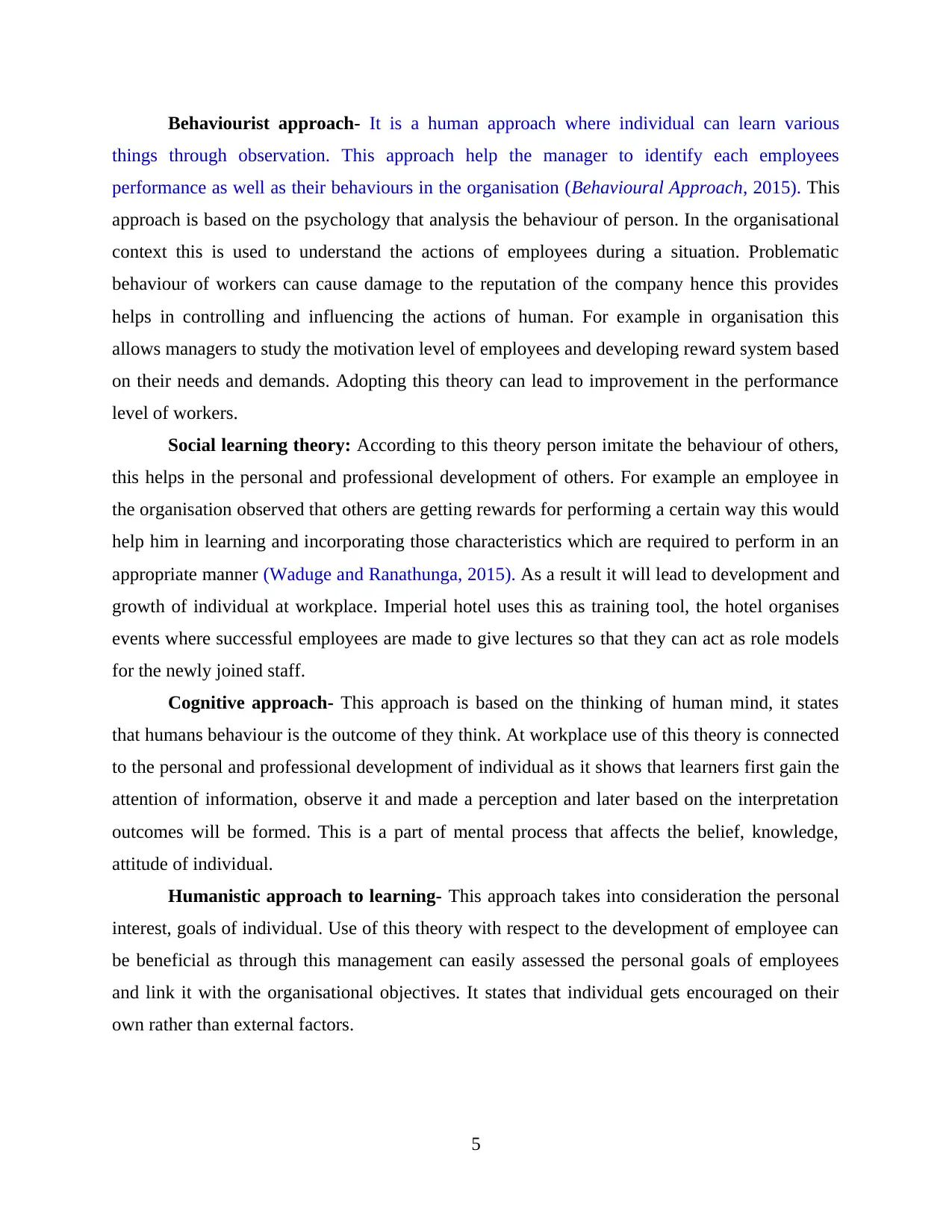
Behaviourist approach- It is a human approach where individual can learn various
things through observation. This approach help the manager to identify each employees
performance as well as their behaviours in the organisation (Behavioural Approach, 2015). This
approach is based on the psychology that analysis the behaviour of person. In the organisational
context this is used to understand the actions of employees during a situation. Problematic
behaviour of workers can cause damage to the reputation of the company hence this provides
helps in controlling and influencing the actions of human. For example in organisation this
allows managers to study the motivation level of employees and developing reward system based
on their needs and demands. Adopting this theory can lead to improvement in the performance
level of workers.
Social learning theory: According to this theory person imitate the behaviour of others,
this helps in the personal and professional development of others. For example an employee in
the organisation observed that others are getting rewards for performing a certain way this would
help him in learning and incorporating those characteristics which are required to perform in an
appropriate manner (Waduge and Ranathunga, 2015). As a result it will lead to development and
growth of individual at workplace. Imperial hotel uses this as training tool, the hotel organises
events where successful employees are made to give lectures so that they can act as role models
for the newly joined staff.
Cognitive approach- This approach is based on the thinking of human mind, it states
that humans behaviour is the outcome of they think. At workplace use of this theory is connected
to the personal and professional development of individual as it shows that learners first gain the
attention of information, observe it and made a perception and later based on the interpretation
outcomes will be formed. This is a part of mental process that affects the belief, knowledge,
attitude of individual.
Humanistic approach to learning- This approach takes into consideration the personal
interest, goals of individual. Use of this theory with respect to the development of employee can
be beneficial as through this management can easily assessed the personal goals of employees
and link it with the organisational objectives. It states that individual gets encouraged on their
own rather than external factors.
5
things through observation. This approach help the manager to identify each employees
performance as well as their behaviours in the organisation (Behavioural Approach, 2015). This
approach is based on the psychology that analysis the behaviour of person. In the organisational
context this is used to understand the actions of employees during a situation. Problematic
behaviour of workers can cause damage to the reputation of the company hence this provides
helps in controlling and influencing the actions of human. For example in organisation this
allows managers to study the motivation level of employees and developing reward system based
on their needs and demands. Adopting this theory can lead to improvement in the performance
level of workers.
Social learning theory: According to this theory person imitate the behaviour of others,
this helps in the personal and professional development of others. For example an employee in
the organisation observed that others are getting rewards for performing a certain way this would
help him in learning and incorporating those characteristics which are required to perform in an
appropriate manner (Waduge and Ranathunga, 2015). As a result it will lead to development and
growth of individual at workplace. Imperial hotel uses this as training tool, the hotel organises
events where successful employees are made to give lectures so that they can act as role models
for the newly joined staff.
Cognitive approach- This approach is based on the thinking of human mind, it states
that humans behaviour is the outcome of they think. At workplace use of this theory is connected
to the personal and professional development of individual as it shows that learners first gain the
attention of information, observe it and made a perception and later based on the interpretation
outcomes will be formed. This is a part of mental process that affects the belief, knowledge,
attitude of individual.
Humanistic approach to learning- This approach takes into consideration the personal
interest, goals of individual. Use of this theory with respect to the development of employee can
be beneficial as through this management can easily assessed the personal goals of employees
and link it with the organisational objectives. It states that individual gets encouraged on their
own rather than external factors.
5
Paraphrase This Document
Need a fresh take? Get an instant paraphrase of this document with our AI Paraphraser
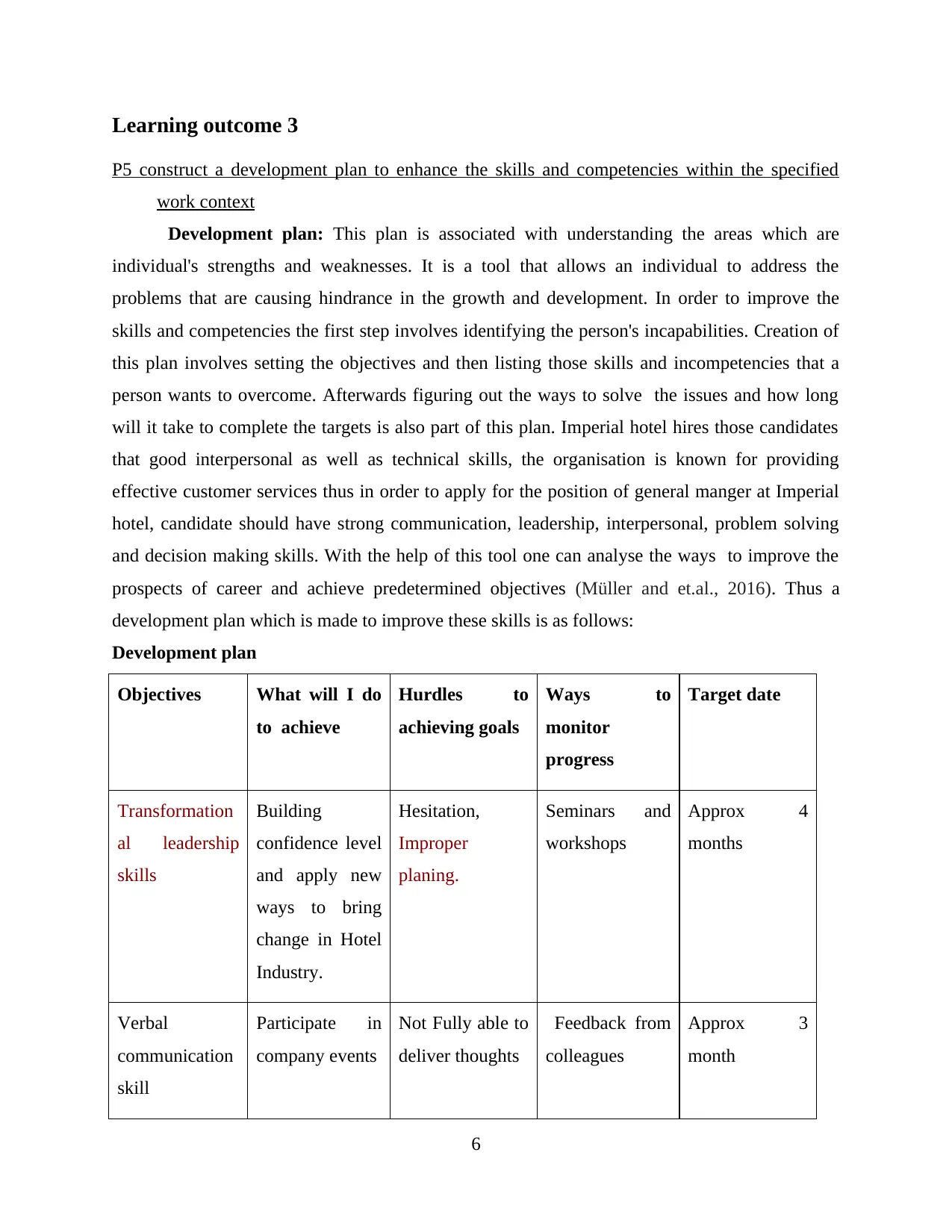
Learning outcome 3
P5 construct a development plan to enhance the skills and competencies within the specified
work context
Development plan: This plan is associated with understanding the areas which are
individual's strengths and weaknesses. It is a tool that allows an individual to address the
problems that are causing hindrance in the growth and development. In order to improve the
skills and competencies the first step involves identifying the person's incapabilities. Creation of
this plan involves setting the objectives and then listing those skills and incompetencies that a
person wants to overcome. Afterwards figuring out the ways to solve the issues and how long
will it take to complete the targets is also part of this plan. Imperial hotel hires those candidates
that good interpersonal as well as technical skills, the organisation is known for providing
effective customer services thus in order to apply for the position of general manger at Imperial
hotel, candidate should have strong communication, leadership, interpersonal, problem solving
and decision making skills. With the help of this tool one can analyse the ways to improve the
prospects of career and achieve predetermined objectives (Müller and et.al., 2016). Thus a
development plan which is made to improve these skills is as follows:
Development plan
Objectives What will I do
to achieve
Hurdles to
achieving goals
Ways to
monitor
progress
Target date
Transformation
al leadership
skills
Building
confidence level
and apply new
ways to bring
change in Hotel
Industry.
Hesitation,
Improper
planing.
Seminars and
workshops
Approx 4
months
Verbal
communication
skill
Participate in
company events
Not Fully able to
deliver thoughts
Feedback from
colleagues
Approx 3
month
6
P5 construct a development plan to enhance the skills and competencies within the specified
work context
Development plan: This plan is associated with understanding the areas which are
individual's strengths and weaknesses. It is a tool that allows an individual to address the
problems that are causing hindrance in the growth and development. In order to improve the
skills and competencies the first step involves identifying the person's incapabilities. Creation of
this plan involves setting the objectives and then listing those skills and incompetencies that a
person wants to overcome. Afterwards figuring out the ways to solve the issues and how long
will it take to complete the targets is also part of this plan. Imperial hotel hires those candidates
that good interpersonal as well as technical skills, the organisation is known for providing
effective customer services thus in order to apply for the position of general manger at Imperial
hotel, candidate should have strong communication, leadership, interpersonal, problem solving
and decision making skills. With the help of this tool one can analyse the ways to improve the
prospects of career and achieve predetermined objectives (Müller and et.al., 2016). Thus a
development plan which is made to improve these skills is as follows:
Development plan
Objectives What will I do
to achieve
Hurdles to
achieving goals
Ways to
monitor
progress
Target date
Transformation
al leadership
skills
Building
confidence level
and apply new
ways to bring
change in Hotel
Industry.
Hesitation,
Improper
planing.
Seminars and
workshops
Approx 4
months
Verbal
communication
skill
Participate in
company events
Not Fully able to
deliver thoughts
Feedback from
colleagues
Approx 3
month
6
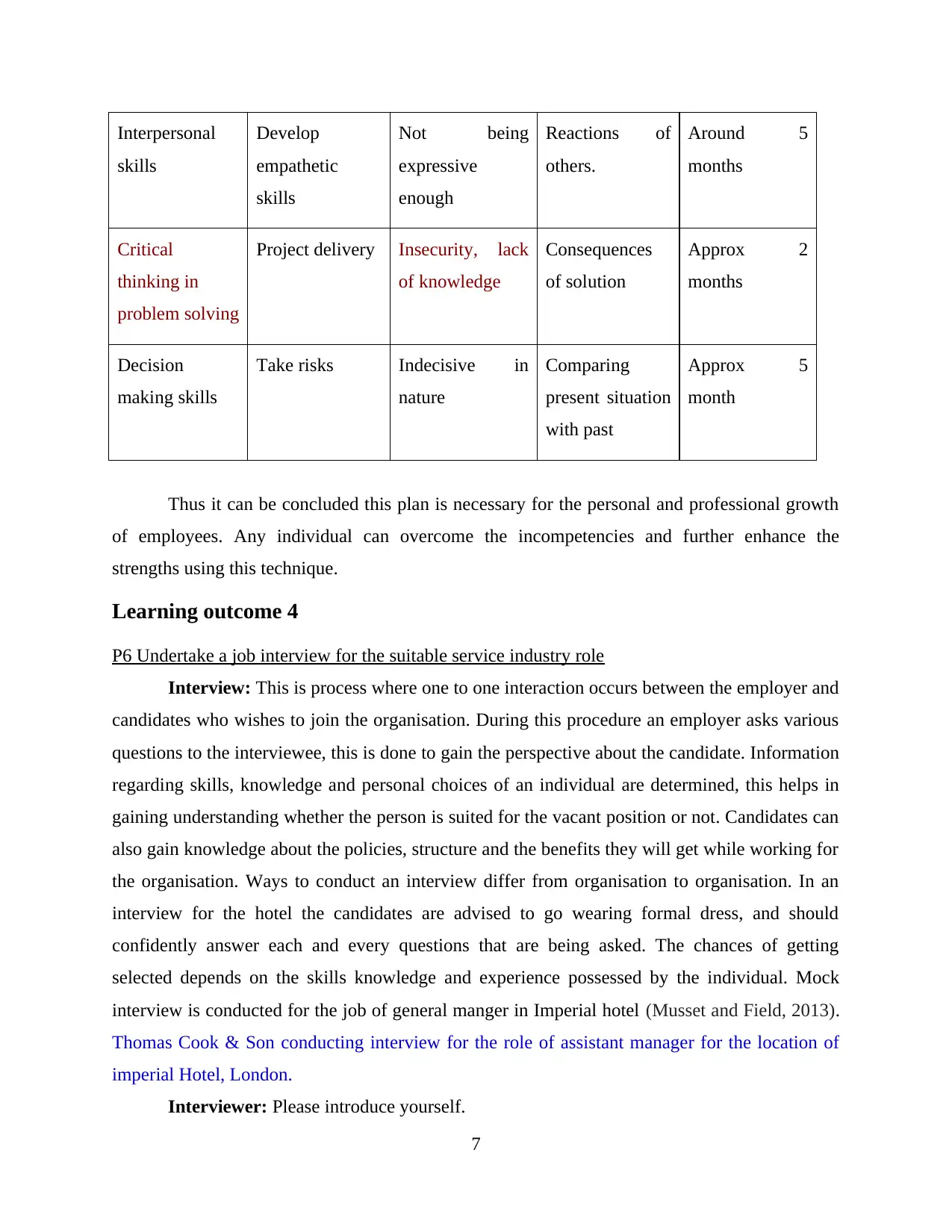
Interpersonal
skills
Develop
empathetic
skills
Not being
expressive
enough
Reactions of
others.
Around 5
months
Critical
thinking in
problem solving
Project delivery Insecurity, lack
of knowledge
Consequences
of solution
Approx 2
months
Decision
making skills
Take risks Indecisive in
nature
Comparing
present situation
with past
Approx 5
month
Thus it can be concluded this plan is necessary for the personal and professional growth
of employees. Any individual can overcome the incompetencies and further enhance the
strengths using this technique.
Learning outcome 4
P6 Undertake a job interview for the suitable service industry role
Interview: This is process where one to one interaction occurs between the employer and
candidates who wishes to join the organisation. During this procedure an employer asks various
questions to the interviewee, this is done to gain the perspective about the candidate. Information
regarding skills, knowledge and personal choices of an individual are determined, this helps in
gaining understanding whether the person is suited for the vacant position or not. Candidates can
also gain knowledge about the policies, structure and the benefits they will get while working for
the organisation. Ways to conduct an interview differ from organisation to organisation. In an
interview for the hotel the candidates are advised to go wearing formal dress, and should
confidently answer each and every questions that are being asked. The chances of getting
selected depends on the skills knowledge and experience possessed by the individual. Mock
interview is conducted for the job of general manger in Imperial hotel (Musset and Field, 2013).
Thomas Cook & Son conducting interview for the role of assistant manager for the location of
imperial Hotel, London.
Interviewer: Please introduce yourself.
7
skills
Develop
empathetic
skills
Not being
expressive
enough
Reactions of
others.
Around 5
months
Critical
thinking in
problem solving
Project delivery Insecurity, lack
of knowledge
Consequences
of solution
Approx 2
months
Decision
making skills
Take risks Indecisive in
nature
Comparing
present situation
with past
Approx 5
month
Thus it can be concluded this plan is necessary for the personal and professional growth
of employees. Any individual can overcome the incompetencies and further enhance the
strengths using this technique.
Learning outcome 4
P6 Undertake a job interview for the suitable service industry role
Interview: This is process where one to one interaction occurs between the employer and
candidates who wishes to join the organisation. During this procedure an employer asks various
questions to the interviewee, this is done to gain the perspective about the candidate. Information
regarding skills, knowledge and personal choices of an individual are determined, this helps in
gaining understanding whether the person is suited for the vacant position or not. Candidates can
also gain knowledge about the policies, structure and the benefits they will get while working for
the organisation. Ways to conduct an interview differ from organisation to organisation. In an
interview for the hotel the candidates are advised to go wearing formal dress, and should
confidently answer each and every questions that are being asked. The chances of getting
selected depends on the skills knowledge and experience possessed by the individual. Mock
interview is conducted for the job of general manger in Imperial hotel (Musset and Field, 2013).
Thomas Cook & Son conducting interview for the role of assistant manager for the location of
imperial Hotel, London.
Interviewer: Please introduce yourself.
7
⊘ This is a preview!⊘
Do you want full access?
Subscribe today to unlock all pages.

Trusted by 1+ million students worldwide
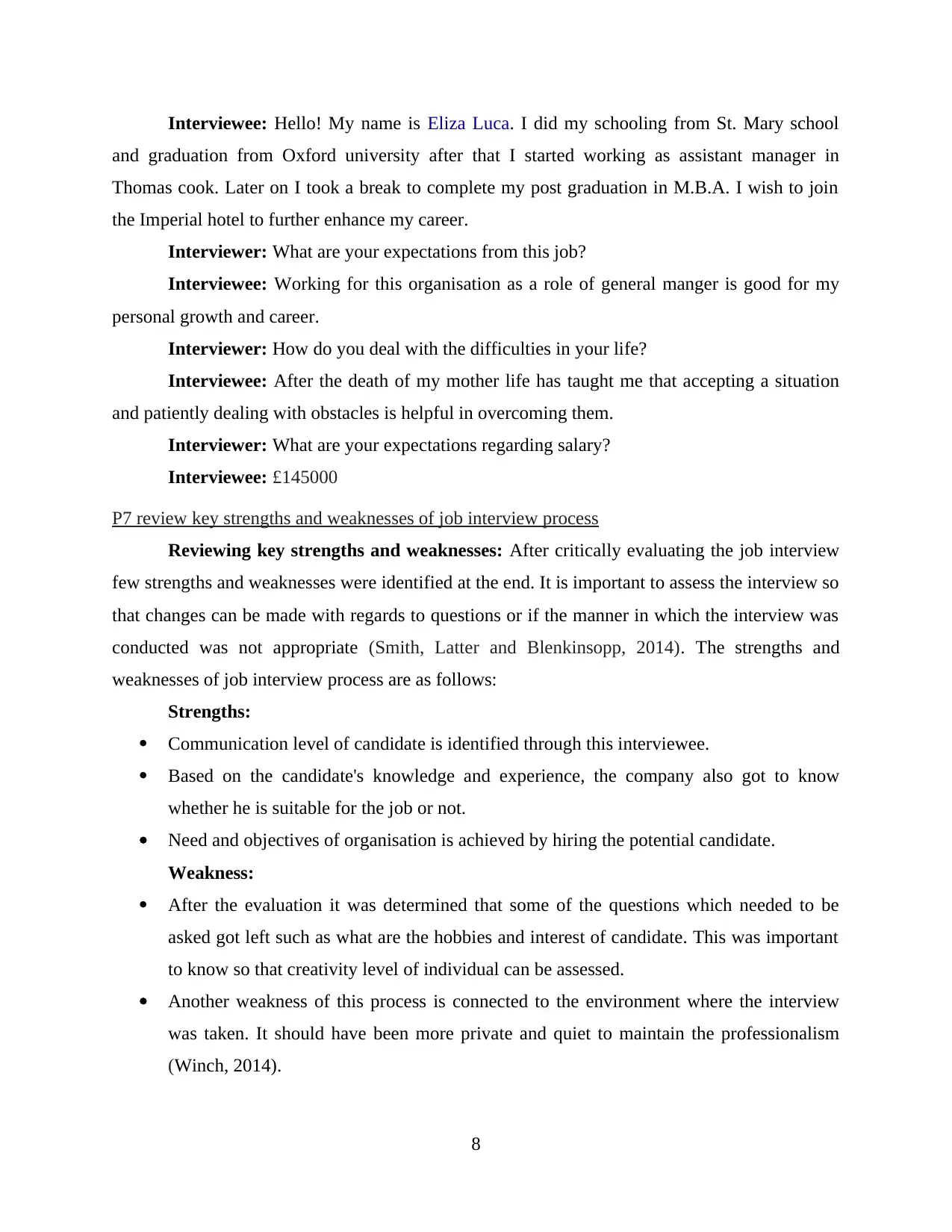
Interviewee: Hello! My name is Eliza Luca. I did my schooling from St. Mary school
and graduation from Oxford university after that I started working as assistant manager in
Thomas cook. Later on I took a break to complete my post graduation in M.B.A. I wish to join
the Imperial hotel to further enhance my career.
Interviewer: What are your expectations from this job?
Interviewee: Working for this organisation as a role of general manger is good for my
personal growth and career.
Interviewer: How do you deal with the difficulties in your life?
Interviewee: After the death of my mother life has taught me that accepting a situation
and patiently dealing with obstacles is helpful in overcoming them.
Interviewer: What are your expectations regarding salary?
Interviewee: £145000
P7 review key strengths and weaknesses of job interview process
Reviewing key strengths and weaknesses: After critically evaluating the job interview
few strengths and weaknesses were identified at the end. It is important to assess the interview so
that changes can be made with regards to questions or if the manner in which the interview was
conducted was not appropriate (Smith, Latter and Blenkinsopp, 2014). The strengths and
weaknesses of job interview process are as follows:
Strengths:
Communication level of candidate is identified through this interviewee.
Based on the candidate's knowledge and experience, the company also got to know
whether he is suitable for the job or not.
Need and objectives of organisation is achieved by hiring the potential candidate.
Weakness:
After the evaluation it was determined that some of the questions which needed to be
asked got left such as what are the hobbies and interest of candidate. This was important
to know so that creativity level of individual can be assessed.
Another weakness of this process is connected to the environment where the interview
was taken. It should have been more private and quiet to maintain the professionalism
(Winch, 2014).
8
and graduation from Oxford university after that I started working as assistant manager in
Thomas cook. Later on I took a break to complete my post graduation in M.B.A. I wish to join
the Imperial hotel to further enhance my career.
Interviewer: What are your expectations from this job?
Interviewee: Working for this organisation as a role of general manger is good for my
personal growth and career.
Interviewer: How do you deal with the difficulties in your life?
Interviewee: After the death of my mother life has taught me that accepting a situation
and patiently dealing with obstacles is helpful in overcoming them.
Interviewer: What are your expectations regarding salary?
Interviewee: £145000
P7 review key strengths and weaknesses of job interview process
Reviewing key strengths and weaknesses: After critically evaluating the job interview
few strengths and weaknesses were identified at the end. It is important to assess the interview so
that changes can be made with regards to questions or if the manner in which the interview was
conducted was not appropriate (Smith, Latter and Blenkinsopp, 2014). The strengths and
weaknesses of job interview process are as follows:
Strengths:
Communication level of candidate is identified through this interviewee.
Based on the candidate's knowledge and experience, the company also got to know
whether he is suitable for the job or not.
Need and objectives of organisation is achieved by hiring the potential candidate.
Weakness:
After the evaluation it was determined that some of the questions which needed to be
asked got left such as what are the hobbies and interest of candidate. This was important
to know so that creativity level of individual can be assessed.
Another weakness of this process is connected to the environment where the interview
was taken. It should have been more private and quiet to maintain the professionalism
(Winch, 2014).
8
Paraphrase This Document
Need a fresh take? Get an instant paraphrase of this document with our AI Paraphraser
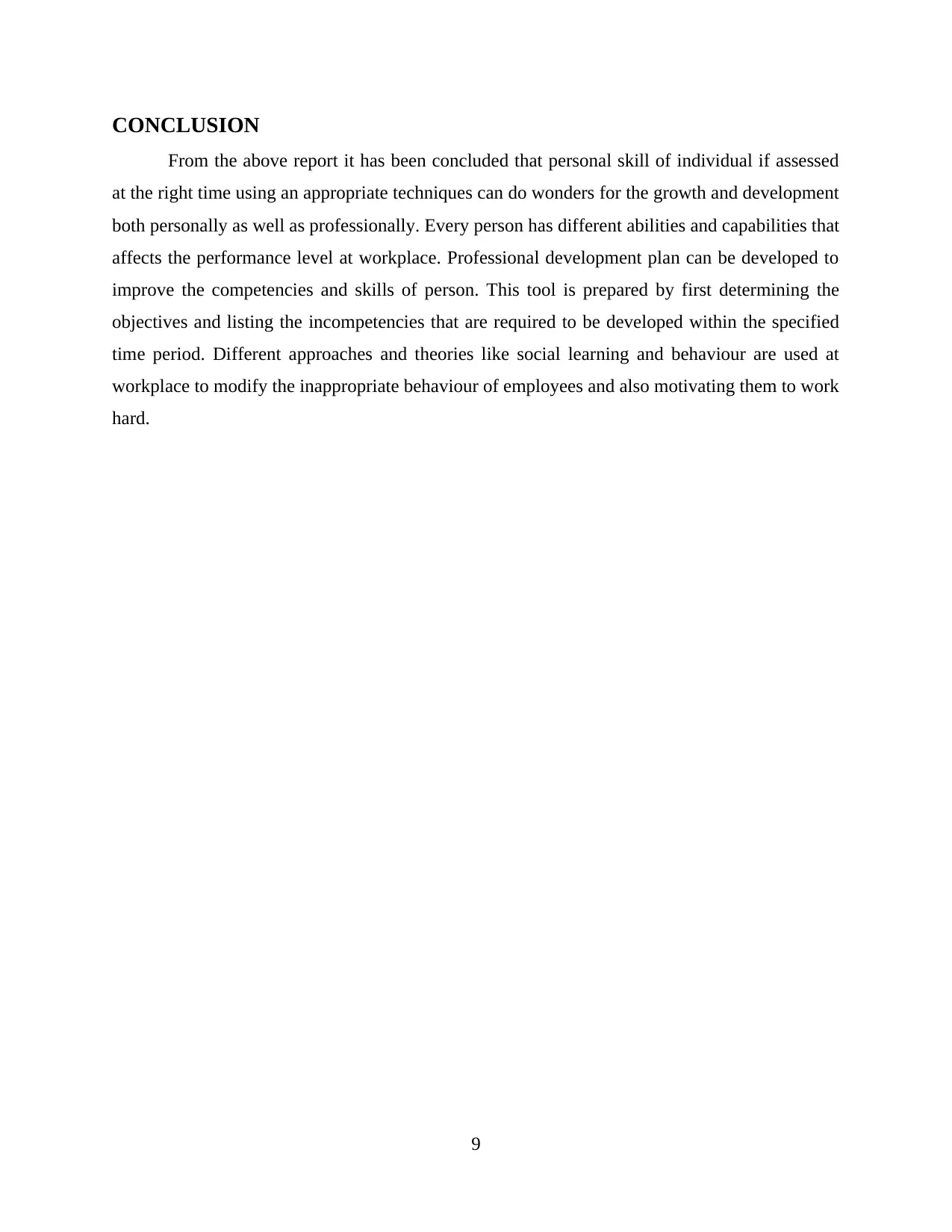
CONCLUSION
From the above report it has been concluded that personal skill of individual if assessed
at the right time using an appropriate techniques can do wonders for the growth and development
both personally as well as professionally. Every person has different abilities and capabilities that
affects the performance level at workplace. Professional development plan can be developed to
improve the competencies and skills of person. This tool is prepared by first determining the
objectives and listing the incompetencies that are required to be developed within the specified
time period. Different approaches and theories like social learning and behaviour are used at
workplace to modify the inappropriate behaviour of employees and also motivating them to work
hard.
9
From the above report it has been concluded that personal skill of individual if assessed
at the right time using an appropriate techniques can do wonders for the growth and development
both personally as well as professionally. Every person has different abilities and capabilities that
affects the performance level at workplace. Professional development plan can be developed to
improve the competencies and skills of person. This tool is prepared by first determining the
objectives and listing the incompetencies that are required to be developed within the specified
time period. Different approaches and theories like social learning and behaviour are used at
workplace to modify the inappropriate behaviour of employees and also motivating them to work
hard.
9
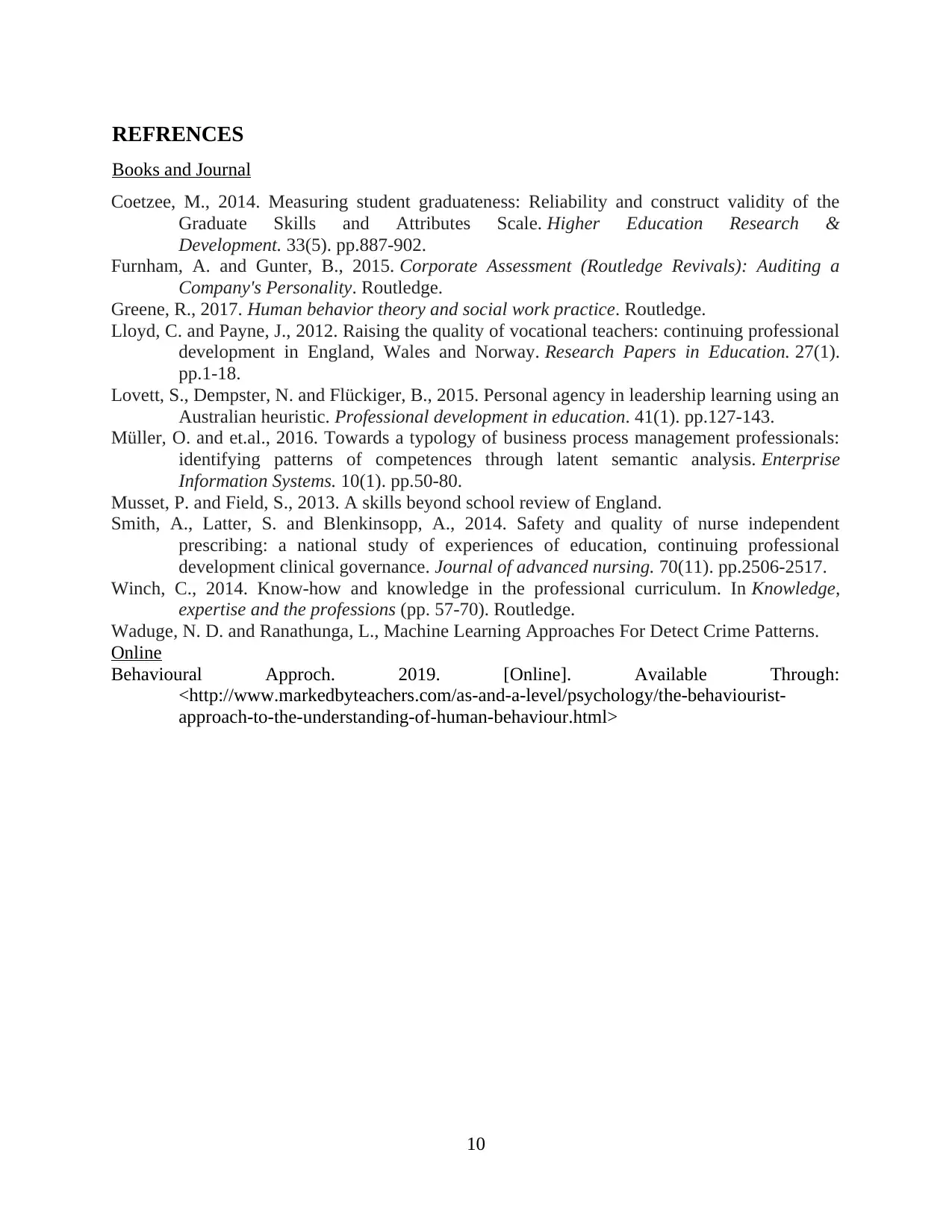
REFRENCES
Books and Journal
Coetzee, M., 2014. Measuring student graduateness: Reliability and construct validity of the
Graduate Skills and Attributes Scale. Higher Education Research &
Development. 33(5). pp.887-902.
Furnham, A. and Gunter, B., 2015. Corporate Assessment (Routledge Revivals): Auditing a
Company's Personality. Routledge.
Greene, R., 2017. Human behavior theory and social work practice. Routledge.
Lloyd, C. and Payne, J., 2012. Raising the quality of vocational teachers: continuing professional
development in England, Wales and Norway. Research Papers in Education. 27(1).
pp.1-18.
Lovett, S., Dempster, N. and Flückiger, B., 2015. Personal agency in leadership learning using an
Australian heuristic. Professional development in education. 41(1). pp.127-143.
Müller, O. and et.al., 2016. Towards a typology of business process management professionals:
identifying patterns of competences through latent semantic analysis. Enterprise
Information Systems. 10(1). pp.50-80.
Musset, P. and Field, S., 2013. A skills beyond school review of England.
Smith, A., Latter, S. and Blenkinsopp, A., 2014. Safety and quality of nurse independent
prescribing: a national study of experiences of education, continuing professional
development clinical governance. Journal of advanced nursing. 70(11). pp.2506-2517.
Winch, C., 2014. Know-how and knowledge in the professional curriculum. In Knowledge,
expertise and the professions (pp. 57-70). Routledge.
Waduge, N. D. and Ranathunga, L., Machine Learning Approaches For Detect Crime Patterns.
Online
Behavioural Approch. 2019. [Online]. Available Through:
<http://www.markedbyteachers.com/as-and-a-level/psychology/the-behaviourist-
approach-to-the-understanding-of-human-behaviour.html>
10
Books and Journal
Coetzee, M., 2014. Measuring student graduateness: Reliability and construct validity of the
Graduate Skills and Attributes Scale. Higher Education Research &
Development. 33(5). pp.887-902.
Furnham, A. and Gunter, B., 2015. Corporate Assessment (Routledge Revivals): Auditing a
Company's Personality. Routledge.
Greene, R., 2017. Human behavior theory and social work practice. Routledge.
Lloyd, C. and Payne, J., 2012. Raising the quality of vocational teachers: continuing professional
development in England, Wales and Norway. Research Papers in Education. 27(1).
pp.1-18.
Lovett, S., Dempster, N. and Flückiger, B., 2015. Personal agency in leadership learning using an
Australian heuristic. Professional development in education. 41(1). pp.127-143.
Müller, O. and et.al., 2016. Towards a typology of business process management professionals:
identifying patterns of competences through latent semantic analysis. Enterprise
Information Systems. 10(1). pp.50-80.
Musset, P. and Field, S., 2013. A skills beyond school review of England.
Smith, A., Latter, S. and Blenkinsopp, A., 2014. Safety and quality of nurse independent
prescribing: a national study of experiences of education, continuing professional
development clinical governance. Journal of advanced nursing. 70(11). pp.2506-2517.
Winch, C., 2014. Know-how and knowledge in the professional curriculum. In Knowledge,
expertise and the professions (pp. 57-70). Routledge.
Waduge, N. D. and Ranathunga, L., Machine Learning Approaches For Detect Crime Patterns.
Online
Behavioural Approch. 2019. [Online]. Available Through:
<http://www.markedbyteachers.com/as-and-a-level/psychology/the-behaviourist-
approach-to-the-understanding-of-human-behaviour.html>
10
⊘ This is a preview!⊘
Do you want full access?
Subscribe today to unlock all pages.

Trusted by 1+ million students worldwide
1 out of 12
Related Documents
Your All-in-One AI-Powered Toolkit for Academic Success.
+13062052269
info@desklib.com
Available 24*7 on WhatsApp / Email
![[object Object]](/_next/static/media/star-bottom.7253800d.svg)
Unlock your academic potential
Copyright © 2020–2025 A2Z Services. All Rights Reserved. Developed and managed by ZUCOL.





